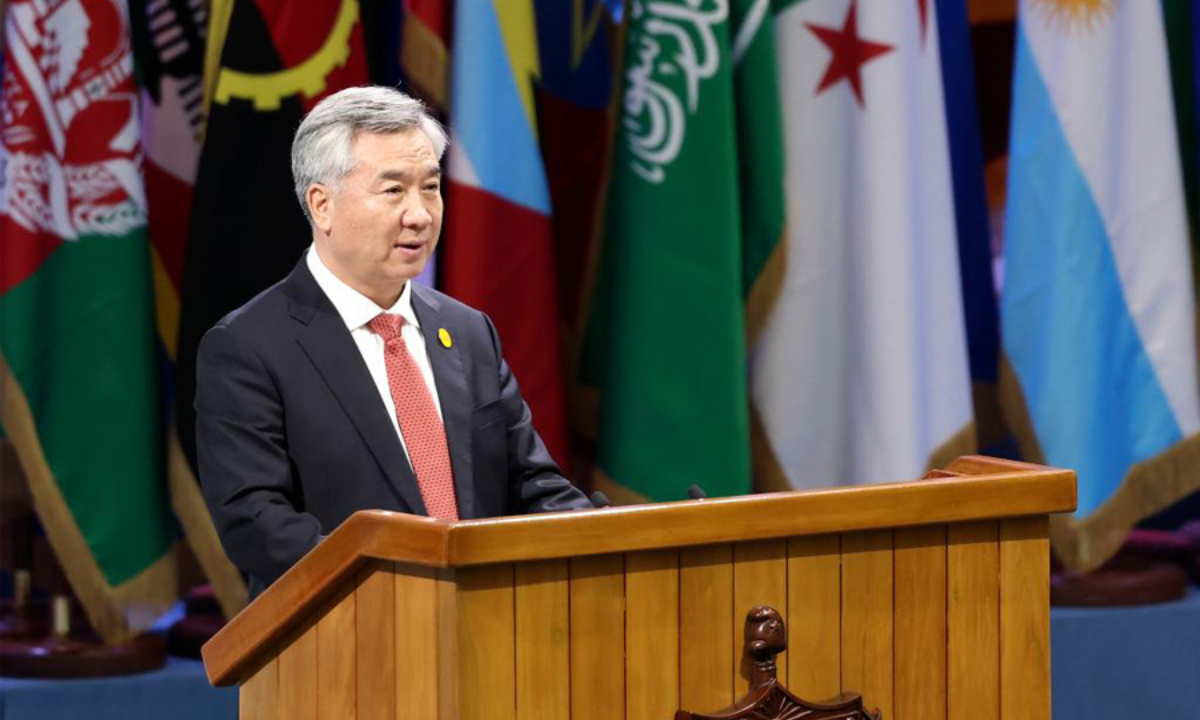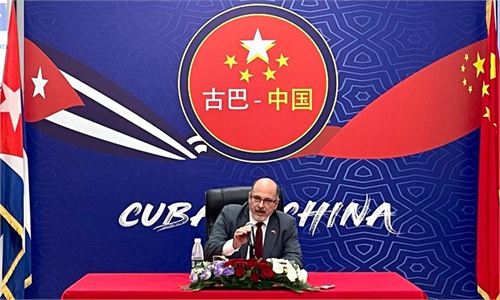China always part of developing world and a member of the Global South, says senior Chinese official at G77+China summit

Li Xi, a member of the Standing Committee of the Political Bureau of the Communist Party of China Central Committee and the special representative of Chinese President Xi Jinping, speaks at the Summit of the Group of 77 (G77) and China in Havana, Cuba, Sep 15, 2023. Photo:Xinhua
South-South cooperation is always a high priority in China's cooperation with other countries, Li Xi, a member of the Standing Committee of the Political Bureau of the Communist Party of China Central Committee, remarked at the Summit of the Group of 77 (G77) and China in Havana, Cuba, on Friday. He stressed that South-South cooperation is China's strategic choice and is not a stopgap measure.
Li, also the special representative of Chinese President Xi Jinping, stated that China is the largest developing country in the world. No matter what stage of development it reaches, China will always be part of the developing world and a member of the Global South.
He continued that the world is undergoing changes on a scale unseen in a century. Developing countries are becoming stronger. A significant shift is taking place in the international balance of power. And South-South cooperation is growing significantly in both quantity and quality, Li said.
According to him, emerging markets and developing countries have contributed as much as 80 percent of the world's economic growth in the past 20 years and now account for more than 40 percent of global GDP, up from 24 percent 40 years ago. South-South cooperation is playing an increasingly important role in driving the momentum of the collective rise of developing countries and in sustaining the continued global economic growth.
At the same time, however, unilateralism and hegemonism are becoming rampant. Some countries are resorting to such practices as unilateral sanctions, erection of "fences and barriers," decoupling, and disruption of industrial and supply chains, seriously undermining the legitimate development rights and interests of developing countries and our space for development.
Chinese experts speak highly of the convening of the summit of G77 and China, saying it was another significant event in the international landscape, as the world is at a crucial turning point.
The biggest challenge in the current global situation is the rampant hegemony, with the process of globalization being undermined by US-initiated unilateralism, while the prospects of a harmonious and integrated world are at stake, Li Haidong, a professor at the China Foreign Affairs University, told the Global Times on Saturday.
Due to the US' strong economic nationalism and the mindset and practice of alliance barriers, global security and mutually beneficial economic development face severe challenges and the threat of disintegration. In this context, in order to ensure that the world order moves in a direction that maximally aligns with the well-being of the majority of countries and people, China and the G77 once again demonstrate themselves as positive political forces in the world, taking decisive actions in a more united, cooperative, and effective manner to safeguard a peaceful and prosperous future for the world, Li Haidong said.
The expert said that South-South cooperation has reached a relatively new height, as evidenced by the strengthening of mechanisms such as BRICS and the G77, as well as the collaboration between the African Union, ASEAN, and relevant international organizations.
Li Xi also noted at the G77 and China summit that during the BRICS Summit in Johannesburg, South Africa, last month, more than 60 developing countries sent a loud and clear message of solidarity and cooperation to the world, calling for reform of global governance to make it more just and equitable. Given such a background, the Havana Summit could not be more timely.
Li Xi stated that China is the world's largest developing nation and a natural member of the Global South. We are ready to work with Cuba and other G77 members to open a new chapter in South-South cooperation in the quest for greater development through stronger solidarity, build a Global South community with a shared future, and usher in a new era of common development.
On behalf of China, he called on the G77 and China to reject bloc confrontation and the Cold War mentality. We must seek to resolve differences and disputes between countries by peaceful means, and we must join hands to maintain world peace and tranquility, fostering an international environment favorable to development.
We must speak up for justice and ensure that items on the United Nations agenda meet the development interests of developing countries. Li Xi expressed support for Uganda in successfully hosting the Third South Summit next year.
He also emphasized the importance of the G77 and China, as the mainstay of South-South cooperation, working together to revitalize the global development partnership and strengthen coordination on macro policies. We need to foster new drivers for our own development, focusing on cooperation in areas such as food security, poverty alleviation, industrialization, green development, digital technology, and artificial intelligence. It is crucial to develop a win-win, cooperative division of labor based on our comparative advantages in order to secure a favorable position in global industrial, supply, and value chains.
China remains committed to building an open, inclusive and mutually beneficial system for South-South scientific and technological cooperation, he noted.
Today, China provides development assistance to more than 160 countries, joins hands with more than 150 countries in building the Belt and Road, and works with over 100 countries and international organizations to advance the GDI, according to Li Xi.
China has set up a Global Development and South-South Cooperation Fund with a total funding of $4 billion, and Chinese financial institutions would soon set up a special fund of $10 billion dedicated to the implementation of the GDI. This is a further contribution by China to helping other developing countries address difficulties and challenges and achieve common development.
As the global security and economic situation are undergoing a critical adjustment period in the post-pandemic era, the collective coordination and development of developing countries are converging into a pivotal force in international political evolution that cannot be ignored, with China playing a crucial role as a driving pillar, Li Haidong pointed out.
He added that the experiences of Western countries in the past decades, including their aggressions and conflicts, have revealed to more countries which ones genuinely prioritize peace and development and which ones only pay lip service while causing turmoil. This reality serves as a catalyst for more developing countries worldwide to engage in effective cooperation with China, the expert noted.


